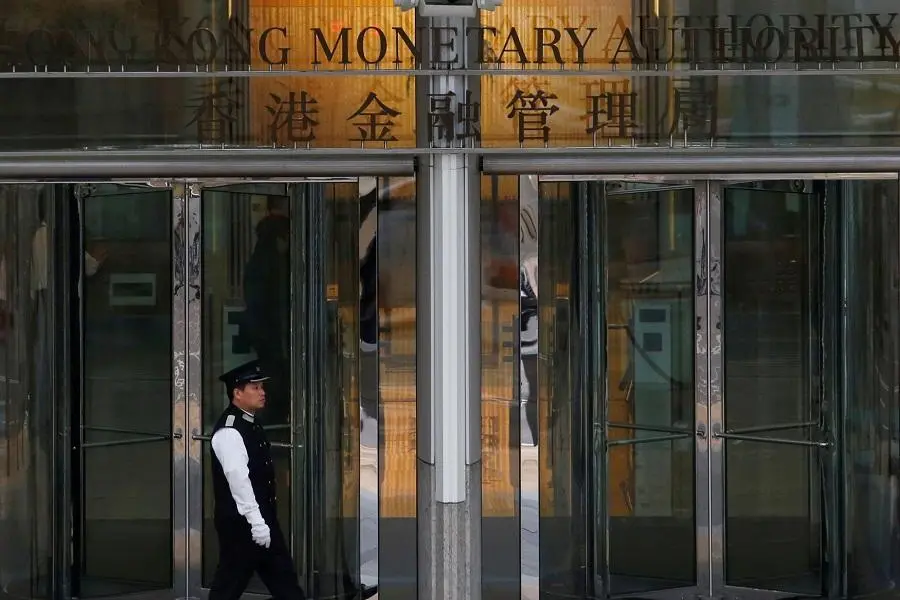PHOTO
HONG KONG - The Hong Kong Monetary Authority (HKMA) raised its base rate charged through its overnight discount window by 25 basis points (bps) on Thursday to 2.00 percent, in lockstep with the U.S Federal Reserve.
The move came as the Hong Kong dollar fell to a fresh 33-year low, and looked set to test the lowend of its trading band, prompting the central bank to reaffirm it would intervene to defend the financial hub's currency peg.
The Fed raised interest rates by a quarter of a percentage point overnight in its first hike this year and forecast at least two more hikes for 2018, signalling growing confidence that U.S. tax cuts and government spending will boost the economy and inflation, and lead to more aggressive future tightening.
Hong Kong tracks U.S. rate moves because its currency is pegged to the U.S. dollar.
The HKMA sets its base rate through a formula that is 50 bps above the prevailing U.S. FedFunds Target or the average of the five-day moving averages of the overnight and one-month HIBORs (Hong Kong Inter-bank Offered Rate).
"The Hong Kong market has been experiencing a huge amount of liquidity. The monetary base ofHong Kong has risen to over HK$1.6 trillion and, as a result, the interbank interest rate had remained very low for a long time," Chan said.
"It would be a good thing for the HK dollar interest rate to normalise in line with the US interest rate."
In December, the HKMA raised the base rate by 25 bps to 1.75 percent and the central bank chief warned at the time that Hong Kong banks would gradually increase mortgage rates.
However, major banks such as HSBC <0005.HK> and Standard Chartered <2888.HK> later left the city's prime lending rate unchanged.
Standard Chartered said on Thursday its best lending rate remained unchanged at 5.25 percent per annum. None of Hong Kong's other top banks had announced changes to their lending rates by 0550 GMT on Thursday.
HK DOLLAR HITS NEW LOW
The Hong Kong dollar fell to 7.8469, inching closer to the lower end of the monetary authority's targeted trading band, as the interest rate gap between U.S. dollar rates and their Hong Kongcounterparts widened further.
"Following the US interest rate hike, I believe the Hong Kong dollar will soon touch its weakest level at 7.85. At that time, we will buy HK dollars and sell US dollars," Chan told reporters.
"HKMA will guarantee that the Hong Kong dollar will not weaken past 7.8500. This is the design and operation of the peg," Chan said.
"As the interest rate gap has widened between Hong Kong and the U.S., capital may flow out and that is something we don't need to worry about much."
Hong Kong's benchmark index <.HSI> eased 0.2 percent on Thursday, while the property sub-index <.HSNP> was flat.
The peg was put in place in 1983 and the current trading band was set in 2005. The system requires Hong Kong's interest rates to closely mirror those in the United States and for the HKMAto intervene to defend both ends of the band.
Most market participants do not see this bout of weakness as a threat to or attack on the peg, unlike instances in the past.
Hong Kong's peg to the U.S. dollar has forced the former British colony to import ultra-loose monetary policy from the U.S. in recent years, with rock bottom interest rates in Hong Konghaving fuelled soaring real estate prices.
Chan said mortgage rates in one of the world's most expensive property markets would have to rise in the longer term.
"Anticipation that HK interest rates will stay at a low level for a long time is an inappropriate anticipation. People have to better manage their risk in borrowing money," Chan said.
Home prices have surged for 15 straight months despite repeated cooling measures, further exacerbating public discontent over housing affordability in the city of 7.4 million.
Analysts expect home prices, which surged 16.7 percent last year, to climb a further 5 to 20 percent in 2018.
Reining in the red-hot property market remains a top priority for the local government, but prices have been rising non-stop since 2016 despite eight rounds of mortgage tightening measures on top of tax and regulatory policies.
"Mortgage rates have been at a low level for a long time. As interest rates normalise, it will put pressure for a mortgage rate hike over the long term. It is a good trend for a healthy development of the Hong Kong property market," Chan added.
China also raised a key short-term interest rate on Thursday following the U.S. Federal Reserve Bank's move, in a symbolic reminder that Beijing is keeping an eye on global market trends even as it cracks down on financial risks at home.
(Reporting by Donny Kwok; Editing by Anne Marie Roantree and Kim Coghill)
© Reuters News 2018





















